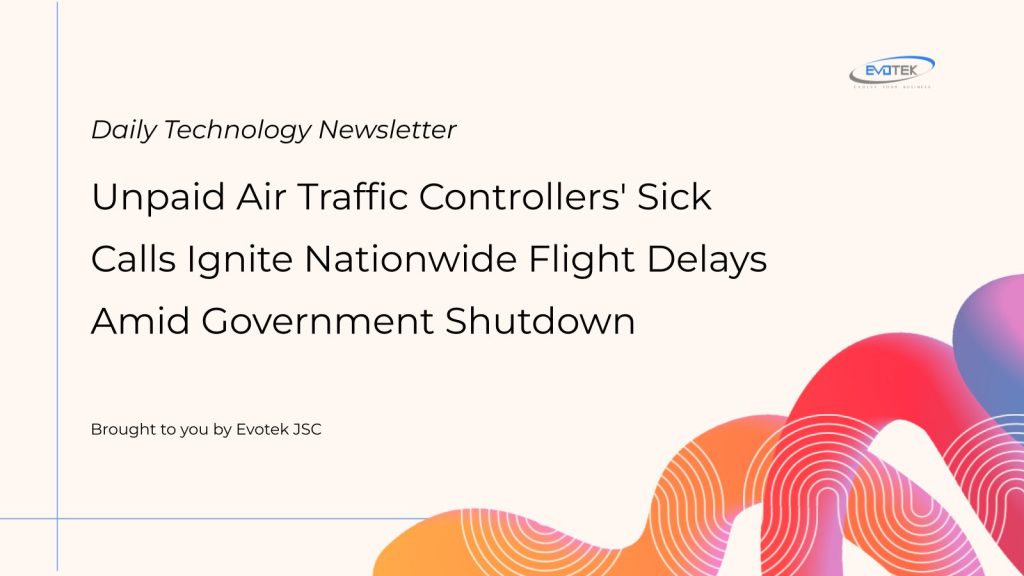The ongoing government shutdown has plunged the nation’s air travel system into disarray, as a surge in sick calls from unpaid air traffic controllers leads to mounting flight cancellations and significant delays across the United States. Despite being deemed essential workers and required to operate without pay, the financial strain on these critical personnel is now directly impacting millions of travelers.
Widespread Disruptions Grip National Airspace
A week into the federal government’s fiscal impasse, the consequences are starkly visible at airports nationwide. Reports indicate a sharp increase in operational disruptions as key airport towers and control facilities struggle with inadequate staffing. Nashville International Airport, for instance, experienced severe limitations in its air traffic control tower operations, forcing the Memphis air traffic control center to manage some approach traffic. This resulted in average flight delays exceeding two hours for flights in and out of Nashville on a recent Tuesday evening.
Other major hubs are also feeling the pinch. Dallas reported average flight delays of approximately 30 minutes, while Chicago faced delays averaging 40 minutes, according to advisories from the Federal Aviation Administration (FAA). These incidents highlight a growing crisis exacerbated by the shutdown.
Pre-existing Staffing Challenges Intensify
While the government shutdown has undeniably brought these issues to the forefront, the National Air Traffic Controllers Association (NATCA) president, Nick Daniels, emphasized that staffing shortages are not a new phenomenon. “You’re finally seeing the issues of a critically staffed air traffic control system,” Daniels stated, revealing that in the past nine months alone, there have been over 1,000 instances where ATC facilities had to temporarily shut down or operate with reduced capacity. The shutdown, he added, “absolutely doesn’t help it, but this is something that we deal with day in and day out.”
Earlier in the week, California’s Hollywood Burbank Airport tower was forced to close for several hours due to a complete lack of controllers, pushing average flight delays beyond 2.5 hours. Controllers from a San Diego facility were pressed into service to manage Burbank’s traffic during the closure. Additionally, facilities including the Philadelphia TRACON, Denver Center, Detroit TRACON, Indianapolis Center, and Phoenix Airport experienced similar staffing advisories, contributing to hundreds of flight delays in Denver and Phoenix. The FAA acknowledged these issues, stating, “When that happens, the FAA slows traffic into some airports to ensure safe operations.”
Financial Hardship Fuels Controller Sick Calls
Transportation Secretary Sean Duffy addressed the concerning rise in sick calls, noting they are spread across various regions, with some facilities experiencing up to a 50 percent reduction in staffing. Duffy expressed deep concern for the controllers, who are high-skilled professionals working under immense pressure. He voiced his apprehension about controllers needing to take on second jobs, like driving for ride-sharing services, to cover their bills. “I don’t want them finding a second job to pay the bills. I want them to get paid for the work they’re doing today, keeping our planes in the air and our skies safe,” Duffy asserted.
Controllers, who are facing an imminent loss of paychecks, are grappling with severe financial anxiety. They are now balancing the intense demands of controlling complex airspace with worries about mortgage payments, car loans, and feeding their families. While they are legally entitled to back pay after the shutdown concludes, the immediate financial burden is immense, with a partial paycheck expected on October 14, but no pay at all on October 28 if the shutdown persists.
Political Blame Game and Broader Impacts
The aviation crisis has also ignited a heated political exchange. California Governor Newsom publicly blamed the government shutdown for the staffing issues, while Transportation Secretary Duffy retaliated, criticizing the Democratic stance on healthcare funding and accusing Newsom of prioritizing other issues over the welfare of American air traffic controllers.
Beyond the controller crisis, the shutdown threatens the Essential Air Service (EAS) program, which subsidizes flights to rural communities that would otherwise lack air travel. This program is projected to run out of funding soon, potentially leaving carriers operating these vital routes without guaranteed payment and disproportionately impacting areas like Alaska, where air travel is often the sole mode of transportation.
Outlook: Continued Uncertainty for Air Travel
As the government shutdown continues, the immediate future of air travel remains precarious. The ongoing financial pressure on air traffic controllers, coupled with pre-existing staffing challenges, promises further disruptions to an already strained national airspace. The ripple effects of this impasse extend beyond major cities, threatening essential services for remote communities and highlighting the critical importance of a fully funded and adequately staffed aviation system.

 日本語
日本語 한국어
한국어 Tiếng Việt
Tiếng Việt 简体中文
简体中文